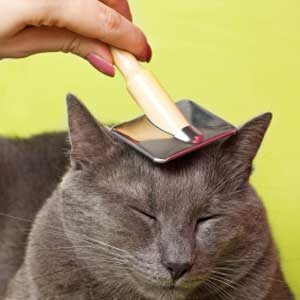
1. Clawing the Couch
Q: How do I get my kitten to stop clawing up the couch? She has a scratching post that she never goes near and I have tried just about everything!
A: It’s important to understand that cats scratch mainly as a way to communicate. While scratching does keep their nails sharp, it also leaves their scent and visual mark which says to the world ‘I live here!’ They do this in high traffic areas on purpose and typically folks hide scratching posts out of view. To encourage your kitten to use the scratching post, place it where everyone frequents, then hold her paws and ‘scratch’ the post with them to leave the scent. Sometimes the height of the post also makes a difference; some cats prefer to stretch all the way up to use it. You can also ask your vet for special sprays to make the post more appealing. Frequent nail trimming also limits damage to furniture. Once your cat knows that it’s okay to use the post (and preferable to using the couch) you can move it out of view. The important thing to remember is that your kitten is not doing this to annoy you; she’s just telling the world that what is yours… is hers!
Dr. Kent Morley is a veterinarian at Properties Animal Clinic, Calgary, Alberta.

2. Scaredy Cat
Q: My Burmese cat is extremely timid and fearful of other cats and all people except my husband and myself. She was a stray cat, but she won’t let my mother anywhere near here, even though she is very affectionate, cuddly and playful with us. Is there a way of making her less fearful around other people?
A: Burmese are generally outgoing and friendly but it is possible your cat missed a critical period in her social development before you adopted her which has impeded her desire to interact with strangers. Have your mother sit alone in a room with her without any interaction, but place some highly tasty cat food or treats close by, making the cat come closer. If your mother lives with you, you could repeat this every day. I also have an adopted cat that was a stray for two years before we took her in. She is very loving with me, but even after 10 years, she still disappears when company arrives. You might try some aromatherapy to help your cat relax more in general. The Bach Flower remedy is popular for stressed-out cats. You put of 2 drops of “Mimulus” in a diffuser bottle filled with spring water and spray it in the air around your cat four times a day.
Cheryl Smith is the owner of Urika Animal Behaviour Consultants in Perth, Ontario.

3. Supplements and Medications
Q: Is it safe to give our cat glucosamine, and if so how much?
A: I am assuming that your cat suffers from some kind of stiffness when walking or has been diagnosed with arthritis which is what glucosamine would be used for to alleviate pain and joint problems. But you should never give your cat, or any other pet for that matter, any form of medicine, natural or otherwise without knowing the proper dosage and also the definitive cause of the ailment. Problems with walking or stiffness can also be signs of hyperthyroidism or kidney failure. You should have a vet check blood work, do a urinalysis, and possibly even take an X-ray to determine the cause. If it is only arthritis, then proper diet and glucosamine would be recommended, but only the kind intended for animals prescribed by a vet, the glucosamine that humans use for medicinal purposes is far too strong! It comes in powdered, capsule or liquid forms and your vet will inform you of the proper dosage for your cat.
Dr. Eva Hadzima is a veterinarian at Dewinton Pet Hospital in Dewinton, Alberta.

4. Brushing and Biting
Q: I have a short hair domestic (barn cat) that is normally affectionate and loving. I brush her daily, but just before I am done brushing she jumps at me and grabs my wrist, bites me and draws blood. She purrs and seems to be enjoying the brushing until she turns on me. Other times, she seems to be in heat, though she has been spayed– and when I approach her at that time, she also bites! What’s up with all this unpredictable temperament?
A: I would have to now more to determine the cause of your cat turning on you like that; each cat has its own temperament and tolerance of humans. Does the cat sleep in the barn, or in your house? If outside, it is semi-feral and will not be too cozy with any humans, even though it likes the brushing, it will let you know that it is not comfortable getting too close to you. As for being in heat, the cat might just be trying to get some more food out of you by rubbing close. But as long as it is basically an outdoor, independent cat, do not expect it to be easily domesticated, and note what part of it your are touching when it turns on you, as it might have a sore spot that you are not aware of! If you discover that this is the case, have your vet give it a check up.
Dr. R Gilogue, DVM, LaSalle Animal Centre, Quebec.

5. Cat Naps Too Long
Q: How many hours should a cat sleep?
A: Sleep is something our cats have really “purrfected”! In a field study by Roger Panaman in Cornwall, England, he found that on average cats will sleep for 9.6 hours per day. Another 5.3 hours is simply resting. Cats are “crepuscular” creatures. That means they are most active at dawn and dusk which follows the normal activity of their natural prey. If your cat is sleeping more than usual, it might be just bored so try stimulating it with interesting toys. But if it doesn’t respond, is extremely lethargic and sleeping many more hours per day than the norm, it could be something physical, so a visit to your veterinarian would be recommended.
Dr. Miranda Bourque, DVM, Foothills Animal Hospital in Okotoks, Alberta.

6. Too Many Hairballs
Q: I have three cats; one is always throwing up hair balls and the other two never do! I give them all hairball paste once a month. Is there something extra I should be giving to the one that always gets sick?
A: Some cats are more prone to hairballs than others and this may be due to grooming behaviour or coat type, or both. I would suggest giving the hairball paste more frequently to the one affected cat. Start at twice weekly and increase up to once daily as needed to control the hairballs. But keep an eye on that cat’s stools, if they become too loose then reduce the paste application frequency.
Dr. Gus Stringel is a veterinarian with Smiths Falls and Merrickville Veterinary Services, Ontario and also works with Big Sky Ranch Animal Sanctuary.